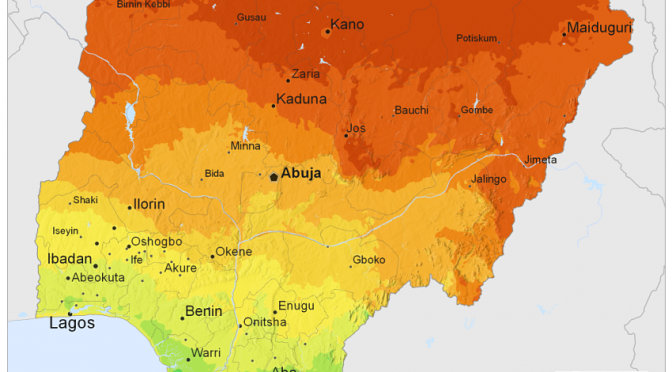Renewable energy is taking domination in Nigeria with the country targeting to accomplish 7 percent renewable energy use by 2025. With the aid of solar energy, the country is working to provide power security to about 160 million of her population and boost her economy.
The solar energy project is however unlocking the country’s economical and industrial potentialities. It is also attracting more foreign investments, new-fangled scientific breakthroughs. Governor Babatunde Fashola of Lagos State said that the effectiveness and deliverance of substitute energy technologies have to be taken improvement of.
Experts have been encouraging the authorities, noting that energy, which stimulates growth, is the bedrock of any economy. Even small and medium scale enterprises need energy if they must develop.
With the once over-dependence of Nigeria on gas to provide national grip is today being substituted with solar energy. Nigeria’s plentiful renewable energy resources that were once neglected have become amongst the economic pillars of the country in the areas of solar energy, biomass, wind energy, micro hydro-energy, hydro energy, biomass and biofuel, and others.
The Nigerian authorities have reckoned with the fact that one of the advantages of renewable energy is that it can be decentralized and, private investors encouraged into it. Specialists have been saying that government cannot do everything alone and that its investment is not sufficient, hence the need for private investment and other sectors to invest in renewable energy.
Professor Titilayo Kuku of the Department of Electronic and Electrical Engineering, at Obafemi Awolowo University, Ile-Ife, stated, “Promotion of renewable energy and energy efficiency in Nigeria will address the challenges of power in the country. Green energy/renewable energy are cleaner sources of energy, and therefore are sustainable forms of energy. Renewable energy can continuously be harvested because they are inexhaustible in supply and have been considered by most developing countries as an essential component of extending access to affordable energy.”
Electricity grid
The Federal Government has to increase 2,483 megawatts (MW) to Nigeria’s electricity grid from renewable sources before the end of the year. While making a presentation on the draft policy, the Director of the Electrical Inspectorate Services (EIS) of the Ministry of Power, Abayomi Adebisi, said that the 2,483MW was targeted for this year.
This, he added, was for a short term mark while 8,188MW and 23,134MW were medium and long term targets for 2020 and 2030 respectively. In the policy, it has become manifest that the ministry of power promotes renewable energy nonstop. Adebisi has though said that renewable energy is predicted to contribute about 1.3 per cent of Nigeria’s energy.
In the same vein, Professor Kuku extolled the invention of renewable energy owing to the crisis facing the country’s electricity generation. In his voice: “With the current generated capacity of about 4,000MW for a population of about 160 million, with energy per capita of 30 watts, the country is in dire straits regarding energy sufficiency with the attendant consequences on all developmental indicators of employment, growth, production, cost of production, security, general wellbeing, among others.”
Individuals and groups support renewable energy
Governor of Lagos State, Fashola has been fighting to protect the environment and stop the resultant effects of climate change. He has been encouraging the residents of Lagos, to use alternative energy sources. The state government had entered into optional sources of energy, which is seen in its solar-powered street lights project.
The governor through one of his Senior Special Assistant on Energy and Mineral Resources, Dr. Fouad Animashaun, at the opening of the fourth Alternative Power Exhibition in Lagos, said that science had afforded substitute alternatives for establishment of energy without obliterating the environment.
“We have the renewable lanterns, renewable cookers; these are developments that will help reduce hazards to our environment. Solar energy is going to be very useful. This is a good time to get one solar product in our houses,” he said.
Because of the highlighted importance of renewable energy, the First City Monument Bank (FCMB) Plc, as part of its Corporate Social Responsibility (CSR), supported Lagos renewable energy project by funding 2,500 rechargeable solar lamps for distribution to school children.
The bank’s Group Head, Corporate Communications, Mr. Ikechukwu Kalu, said: “We have participated in this renewable energy project in partnership with the Lagos State Electricity Board because the project is in line with the moral direction of giving back to society, which we share with the Lagos State Government. At FCMB, we believe that the communities in which we operate must benefit from our presence.”
It was said that Kalu had the perception that the rechargeable solar energy lamps will not only support the beneficiaries in their quest for knowledge, which will eventually lead many out of the vicious cycle of poverty, but also provide opportunity for students to be introduced to the essential paradigm of renewable energy and environmental sustainability.
The General Manager, Lagos State Electricity Board, Mr. Damilola Ogunbiyi, said: “Our aim in providing solar lanterns to school children is to enhance their efficiency and promote studying habits in them. We see FCMB as not only our bankers, but also as our energy development partners in this laudable initiative.”
The United Nation Development Programme (UNDP), said it will execute the Global Environment Facility (GEF) sponsored project aimed at promoting clean technologies and renewable energy in the country in June. Mr. EtiosaUyigue of GEF/UNDP said in an interview with the News Agency of Nigeria (NAN) in Abuja in February, that it will put into practice the Global Environment Facility (GEF) in June. This project was said to be sponsored by UNDP, aimed at promoting clean technologies and renewable energy in the country.



